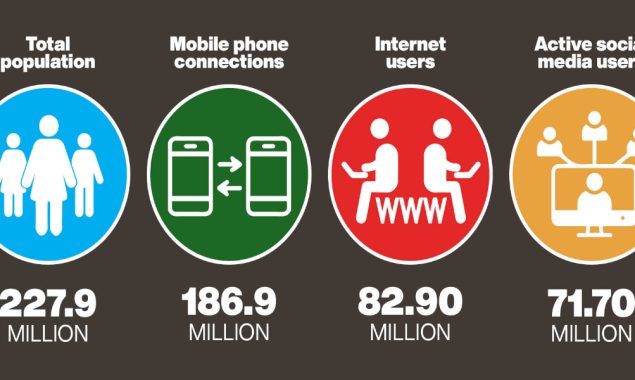
The outbreak of Covid-19 pandemic and the restrictions imposed by the governments on the movement of the people and goods compelled the companies to shift towards innovative solutions by adopting high-tech business practices.
Similarly, the Pakistan government also took several initiatives to shift towards the fast growing digitalisation by promoting e-commerce, teleconferencing, remote working, paperless records and agreements, and digital transactions and payments.
All this accelerated the ongoing process of digital transformation, especially across business and trade.
In Pakistan, ministries, regulatory bodies, committees, and task forces are working hard to facilitate digitalisation. With over 60 per cent of the population being under the age of 30, there is enormous potential for successful digital adoption; however, Pakistan continues to lag behind.
With the onset of Covid-19 pandemic in 2020, efforts were being made to speed up digitalisation both on the part of the public and the private sectors.
The companies made efforts for cloud computing, data protection and cyber-security. Balancing the protective regulations with an environment that encourages innovation, will enable Pakistan to benefit from the new technologies.
The CERP’s Policy Advisory is bridging the gap between research and evidence, and policy implementation in Pakistan. It is working with the local and international stakeholders to develop a deep understanding of the policy and regulatory landscape and high impact policy reforms to enable digital transformation.
According to the World Bank, the Pakistani students are eager to be the part of social innovation, entrepreneurship and inclusive growth. With nearly two-thirds of Pakistan’s population under the age of 24 represents an unprecedented opportunity, as young Pakistanis can greatly contribute to growth and development.
World Bank former president Jim Yong Kim said that Pakistan needs to invest in its people, especially women and youth, to ensure success of the digital Pakistan vision.
“Pakistan has to scale up investment in its people, starting with the pregnant women and focusing especially on youth, to ensure every Pakistani can learn, grow, and participate fully in the digital economy of the future.”
Going digital is critical for youth to enable them to tap into the potential of the globalised world that has changed the way labour markets are working at an international level, he said.
Pakistan has an estimated three to four million youth taking advantage of the global connectivity and digital economy to link with job opportunities internationally.
According to Kim, creative, empowered and connected Pakistani youth are developing innovative solutions for the local issues; thus, presenting endless possibilities for tackling development challenges in the country.
A latest report by UNCTAD on Covid-19 and e-commerce finds that while the global trade in goods and services declined, amid pandemic, the share of the e-commerce industry in global retail increased up to 17 per cent in 2020, which is most likely to continue throughout the recovery times.
The report also suggests that digitalisation of buyers and sellers helped reduce the negative impacts of lockdown on the economy.
While the e-commerce sector and digital trade has been dominated by the developed countries, the Covid-19 pandemic has also steered up the process in developing countries since last year, particularly in Asia, it said.
For instance, China’s online retail share increased from 19 per cent to almost 25 per cent. Thailand witnessed an almost 60 per cent surge in downloading of online shopping apps in just a week during March 2020.
Pakistan has never remained good in keeping pace with the speed and scale of advancement in digital technology.
The digital market in Pakistan is significantly increasing as far as e-commerce, e-payments and electronic businesses are concerned.
According to official data, the market size of the e-commerce industry of Pakistan registered an increase of a record 35 per cent to touch Rs96 billion during the first quarter of 2021, compared with Rs71 billion in the corresponding period of the last year.
Further, the number of online retailers with prepayment have increased one-fourth last year. The digital firms are the ones that got the most out of the post-Covid scenario, with more than 100 per cent growth year-on-year in the last 12 months.
As the ICT sector outperformed all other export service sectors in FY2021 with 47 per cent growth, the demand of ICT-related sectors, including e-commerce, increased manifold, and it appears that this might help the government in its digital Pakistan vision.
Covid-19 has brought an overnight shift towards online shopping, retailing, and online payments. The young generation of the country is making all-out efforts to capitalise the opportunities of the digitalised world by initiating innovative startups in various fields.
The digital infrastructure, which is at its infancy stage in Pakistan, needs a defined regulatory structure, as well as provision of internet to every citizen to strengthen the digital economy.
It appears that the progress will remain dreary for Pakistan, which is already way behind in technological advancement until investments are made in research and innovation.
Read More News On
Catch all the Business News, Breaking News Event and Latest News Updates on The BOL News
Download The BOL News App to get the Daily News Update & Follow us on Google News.




